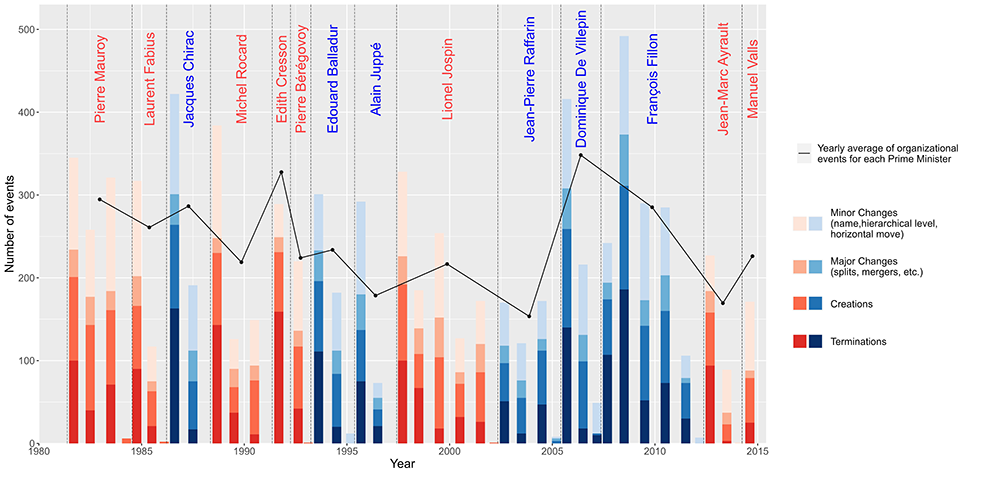


Child Support: Why Isn’t it More Common and Significant in France?
21 July 2023
Enlargement of the European Union: Stop or Else?
21 September 2023How often and how intensively are administrative structures inside central governments created, split up, merged and reformed by hierarchically shifting them, changing their names or even abolishing them? Every year around 18% of the main internal structures in ministerial departments (directorates general, services, directorates, sub-directorates) in France are reorganised, involving an annual average of 1,330 entities between 1980 and 2014.
The graph below (by Yuma Ando, assistant statistician at the Center for European Studies and Comparative Politics) shows the evolution of these reorganisations from 1980 to 2014, presented by the prime ministerial term.
Click on the graph to enlarge it
It notably shows that reorganisations are more numerous during the first two years of a government’s term: restructuring ministries symbolically reflects new public policy objectives, but primarily redistributes power and expertise among administrative structures in order to align policies with campaign commitments.
There is no significant left-right difference in the use of reorganisation. The ‘politics of organisation’ (“La politique de l’organisation“, Bezes, Le Lidec, revue française de science politique, 2016) – i.e. the reshaping of administrative structures – thus appears to be a means to exercise power across the political spectrum.
Finally, the number of reorganisations varies from one prime ministerial term to the next, but the variation is related to term duration: the average annual number of reorganisations per prime ministerial term (black curve) shows that the Mauroy, Fabius and Cresson governments on the left, and the Chirac, de Villepin and Fillon governments on the right recorded major waves of reorganisation inside ministries. Reorganisation methods vary creations and terminations are most common, while the least common (splits, mergers) may yield the greatest power redistribution in central administrations.
This graph is drawn from an original database created as part of the comparative Structure and Organization of Governments Project (SOG-PRO), which received Open Research Area Plus (ORA) funding between 2014 and 2019, combining resources from the French National Research Agency (ANR), the German Research Foundation (DFG), Great Britain’s Economic and Social Research Council (ESRC) and the Dutch Research Council (NWO). Philippe Bezes, CNRS Research Director at CEE, leads the project in France. The SOG-PRO French team currently includes Timothée Chabot (PhD in sociology from the European Institute in Florence and senior lecturer in sociology at University Toulouse 2) and Scott Viallet-Thévenin (PhD in sociology from Sciences Po, associate researcher at the Center for the Sociology of Organisations at Sciences Po). The project involves three other research teams based at the universities of Leiden (coordinator Kutsal Yesilkagit), Potsdam (coordinator Julia Fleischer) and Exeter (coordinator Oliver James).




